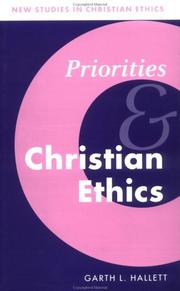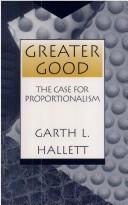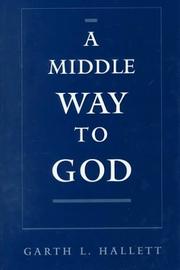| Listing 1 - 10 of 19 | << page >> |
Sort by
|
Book
ISBN: 0300040121 Year: 1988 Publisher: New Haven (Conn.): Yale university
Abstract | Keywords | Export | Availability | Bookmark
 Loading...
Loading...Choose an application
- Reference Manager
- EndNote
- RefWorks (Direct export to RefWorks)
Lexicology. Semantics --- Philosophy of language --- Theory of knowledge --- Language and languages --- -Truth --- Conviction --- Belief and doubt --- Philosophy --- Skepticism --- Certainty --- Necessity (Philosophy) --- Pragmatism --- Foreign languages --- Languages --- Anthropology --- Communication --- Ethnology --- Information theory --- Meaning (Psychology) --- Philology --- Linguistics --- Truth. --- Philosophy. --- Truth
Book
ISBN: 0819138037 Year: 1984 Publisher: Lanham University press of America
Abstract | Keywords | Export | Availability | Bookmark
 Loading...
Loading...Choose an application
- Reference Manager
- EndNote
- RefWorks (Direct export to RefWorks)
Language and logic. --- Language and logic --- Linguistics and logic --- Logic in language --- Language and languages --- Logic --- Semantics --- Philosophy
Book
ISBN: 0878404805 0585202567 9780585202563 9780878404803 Year: 1989 Publisher: Washington (D.C.): Georgetown university press
Abstract | Keywords | Export | Availability | Bookmark
 Loading...
Loading...Choose an application
- Reference Manager
- EndNote
- RefWorks (Direct export to RefWorks)
Love --- Religious aspects --- Christianity. --- Christianity --- History of doctrines. --- 241.513 --- 241.513 Goddelijke deugden: liefde --- Goddelijke deugden: liefde --- Affection --- Emotions --- First loves --- Friendship --- Intimacy (Psychology) --- Religious aspects&delete& --- Christianity&delete& --- History of doctrines --- Love (Theology) --- Love - Religious aspects - Christianity. --- Love - Religious aspects - Christianity - History of doctrines.
Book
ISBN: 0801409977 9780801409974 Year: 1977 Publisher: Ithaca (N.Y.): Cornell university press
Abstract | Keywords | Export | Availability | Bookmark
 Loading...
Loading...Choose an application
- Reference Manager
- EndNote
- RefWorks (Direct export to RefWorks)

ISBN: 0521623510 0521090857 0511585497 0511007825 9780511007828 9780521090858 9780511585494 9780521623513 Year: 1998 Volume: 12 Publisher: Cambridge Cambridge University press
Abstract | Keywords | Export | Availability | Bookmark
 Loading...
Loading...Choose an application
- Reference Manager
- EndNote
- RefWorks (Direct export to RefWorks)
This book provides the fullest contemporary treatment of an issue which is particularly pressing today: when the claims of the nearest (e.g. parents, children, spouses, friends) conflict with the claims of the neediest, as they constantly do, where should preference go? [publisher's description]
Christelijke ethiek --- Christian ethics --- Christianisme--Morale --- Ethique chrétienne --- Moraaltheologie --- Moral theology --- Morale chrétienne --- Prioriteit (Filosofie) --- Priority (Philosophy) --- Priorité (Philosophie) --- Theologie [Moraal] --- Theology [Moral ] --- Théologie morale --- 241.3 --- Philosophy --- Ethical theology --- Theology, Ethical --- Theology, Moral --- Christian life --- Christian philosophy --- Religious ethics --- 241.3 Theologische ethiek: recht en wet --- Theologische ethiek: recht en wet --- Arts and Humanities --- Religion --- Christian ethics.

ISBN: 0585209901 9780585209906 0878405984 0878405909 9780878405985 9780878405909 1589018575 9781589018570 Year: 1995 Publisher: Washington, D.C. Georgetown University Press
Abstract | Keywords | Export | Availability | Bookmark
 Loading...
Loading...Choose an application
- Reference Manager
- EndNote
- RefWorks (Direct export to RefWorks)
Christian ethics --- Proportionality (Ethics) --- Proportionalism (Ethics) --- Ethics --- Catholic authors. --- 241.2 --- Catholic authors --- Geweten en verantwoordelijkheid --- 241.2 Geweten en verantwoordelijkheid
Book
ISBN: 1435648447 9781435648449 0791478777 Year: 2008 Publisher: Albany, New York : State University of New York Press,
Abstract | Keywords | Export | Availability | Bookmark
 Loading...
Loading...Choose an application
- Reference Manager
- EndNote
- RefWorks (Direct export to RefWorks)
How much authority should language, the medium of communication, be accorded as a determinant of truth and therefore of what we say? Garth L. Hallett argues that, although never explicitly debated, this is the most significant issue of linguistic philosophy. Here, for the first time, he traces the issue's story. Starting with representative thinkers—Plato, Aquinas, Kant, Frege, and the early Wittgenstein—who contested language's authority, the narrative then focuses on thinkers such as Carnap, Tarski, the later Wittgenstein, Flew, Russell, Malcolm, Austin, Kripke, Putnam, Strawson, Quine, and Habermas who, in different ways and to varying degrees, accorded language more authority. Implicit in this account is a challenge to philosophy as still widely practiced.
Language and languages --- Philology & Linguistics --- Languages & Literatures --- Philosophy. --- Philosophy

ISBN: 1280472928 0195351037 0585365687 9780585365688 9780195132687 0195132688 9781280472923 0195132688 9780195351033 0197729908 Year: 2000 Publisher: Oxford New York Oxford University Press
Abstract | Keywords | Export | Availability | Bookmark
 Loading...
Loading...Choose an application
- Reference Manager
- EndNote
- RefWorks (Direct export to RefWorks)
Garth Hallett explores the thesis that if belief in other minds is rational and true, so too is belief in God. He charts a middle way between rival positions to make a case that belief in God and belief in other minds is epistemically comparable.
God --- Other minds (Theory of knowledge) --- Minds of others (Theory of knowledge) --- Knowledge, Theory of --- Mind and body --- Proof. --- Proof
Book
ISBN: 0585064458 9780585064451 079140773X 0791407748 9780791407745 9780791407738 1438405561 Year: 1991 Publisher: Albany State University of New York Press
Abstract | Keywords | Export | Availability | Bookmark
 Loading...
Loading...Choose an application
- Reference Manager
- EndNote
- RefWorks (Direct export to RefWorks)
Language and logic. --- Essentialism (Philosophy) --- Semantics (Philosophy) --- Language and logic --- Logic --- Philosophy --- Philosophy & Religion --- Linguistics and logic --- Logic in language --- Language and languages --- Semantics --- Intension (Philosophy) --- Logical semantics --- Semantics (Logic) --- Semeiotics --- Significs --- Syntactics --- Unified science --- Logic, Symbolic and mathematical --- Logical positivism --- Meaning (Psychology) --- Philosophy, Modern --- Semiotics --- Signs and symbols --- Symbolism --- Analysis (Philosophy) --- Definition (Philosophy) --- Essence (Philosophy) --- Substance (Philosophy) --- Wittgenstein, Ludwig, --- Wei-tʻe-ken-ssu-tʻan, --- Wei-tʻe-ken-ssu-tʻan, Lu-te-wei-hsi, --- Wittgenstein, L. --- Vitgenshteĭn, L., --- Wei-ken-ssu-tʻan, --- Pitʻŭgensyutʻain, --- Vitgenshteĭn, Li︠u︡dvig, --- Weitegenshitan, --- Wittgenstein, Ludovicus, --- Vitgenshtaĭn, Ludvig, --- ויטגנשטיין, לודוויג --- 维特根斯坦, --- Wittgenstein, Ludwig Josef Johann, --- Contributions in criticism of essentialism.
Book
ISBN: 0739182870 9780739182871 9780739182864 0739182862 Year: 2014 Publisher: Lanham
Abstract | Keywords | Export | Availability | Bookmark
 Loading...
Loading...Choose an application
- Reference Manager
- EndNote
- RefWorks (Direct export to RefWorks)
Invisible Language: Its Incalcuable Significance for Philosophy affirms that a greater awareness of language, philosophy's universal medium, could have altered the history of philosophy beyond recognition. Striking a balance between in-depth studies and more over-arching discussions, Garth L. Hallet proves the greatness of the possibilities of philosophy conducted with fuller linguistic awareness.
Philosophy --- Language and languages --- History. --- Philosophy.
| Listing 1 - 10 of 19 | << page >> |
Sort by
|

 Search
Search Feedback
Feedback About UniCat
About UniCat  Help
Help News
News